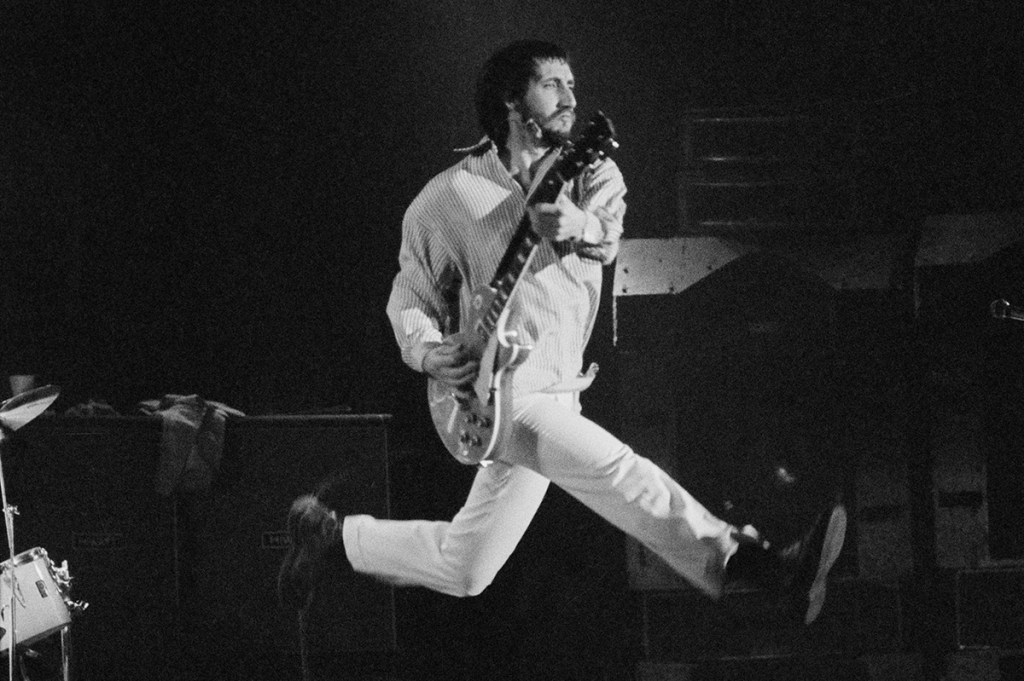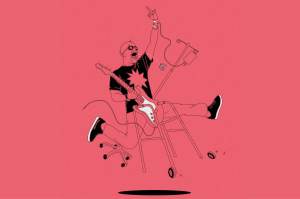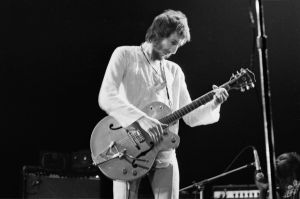This article is in The Spectator’s February 2020 US edition. Subscribe here.
When most rock stars have trouble sleeping, they fall back on Valium, heroin or Jack Daniel’s. But Pete Townshend, guitarist and songwriter for the Who and — I’m pleased to discover — Spectator subscriber, isn’t much like most rock stars. Sober now for three decades, he calls instead on his wife’s psychic powers.
‘Sometimes,’ he says, ‘when I’m having difficulty sleeping, Rachel, who has some…certainly, some kind of healing powers, will say to me, “Do you want me to send you a sleep bubble?”’
Not very rock’n’roll, is it? ‘No, it’s not. But I go, “Yes, darling, that would be lovely. Thank you.” And my head hits the pillow and I black out. Either she’s hypnotizing me or she’s really sending me a sleep bubble, or maybe I’m just cooperating with her eccentricities — I don’t know what — but her sleep bubbles work. And in my own world, my own intuition is extraordinary: absolutely extraordinary. And I don’t talk about it very much…’
The issue arises because Townshend’s first novel, The Age of Anxiety, which we’re here to discuss, is shot through with ideas of ecstatic and paranormal experience. Its narrator, a dealer in outsider art, sees demons in a bedpost during heroin withdrawal; one of his clients is an old rock star who had a nervous breakdown, lived as a hermit for years and communed with angels; the protagonist, the narrator’s godson, is a musician who starts to experience debilitating aural hallucinations, picking up the anxious internal monologues of those around him.
These monologues are the basis of the 15 or so ‘soundscapes’ — described in something like prose poems in the text — that Townshend builds the story around. ‘This is the stuff of this story: this is the guts of it,’ he says. ‘This is the backbone of it, which is this young musician develops out of the blue… he starts to hear the anxieties, the fears, the distractions, the tension, swilling around in the audience that he’s playing for.’
All this, in Townshend’s account, is to be taken as more than metaphor. Again unlike most rock stars, he is a longtime student of Sufi mysticism and the guru Meher Baba (hat-tipped in the title of his 1971 song ‘Baba O’Riley’). He has literary chops too, having published short stories and a well-regarded autobiography and worked, in its 1980s ‘Fabber and Fabber’ years, as an acquisitions editor at the British publisher Faber and Faber — where T.S. Eliot was once an editor.
He very much credits the idea of a connection between madness or visionary experience and art: ‘I think that artists definitely see things in a different way. You could say “drug-induced”, you could say “alcohol-induced”, but that’s not my inference. My inference is that this is somebody who’s trying to push their creative envelope a bit further, a bit further and a bit further and then finds, actually, “Bang!” — suddenly they’re working in another arena, another manner. And I think really inspired writing — and Gabriel García Márquez is probably a good example but there are many — of people who have, in a sense, tried to write and open up their consciousness… That’s in a sense what I suppose I’ve done.’
The obvious question to ask a musician turned first-time novelist late in life is: what was it about this story that demanded to be expressed in prose fiction rather than, say, a song, an opera or an album? But that question doesn’t quite work when it comes to The Age of Anxiety. It’s described as having been ‘jointly conceived as an opera’, and Townshend sees the novel as his ‘clean-sheet’ project, the foundation on which a whole range of musical and artistic projects may be built.
‘I should probably never have used the word “opera” because I don’t know whether this will be an opera,’ he says. ‘It may be a song cycle. It may be a reading like Dylan Thomas’s Under Milk Wood. I don’t know. But I’ve written a libretto, based on the book. At the heart of the story is music, is sound, is the music business. There’s a bunch of musicians and a bunch of painters and artists and the widow of an artist and, of course, a concert at the end. Music in the story is really important. This is my currency; this is my language; this is what I know best of all.’
Indeed, on the very first page of the book there’s a version of one of his best-known lyrics, from ‘Baba O’Riley’: ‘I don’t need to be forgiven’. Is that a theme for him? ‘It must be unconscious. I think there are only so many buzz lines — aren’t there? — that you can refer to. You know, “Meet the new boss, same as the old boss”, “The kids are alright”. Some of mine pop up all the time [in the media].’
He sounds only a little peeved that there are no royalties payable on headlines. Was it the operatic aspect, I wonder, that licensed the credibility-stretching series of coincidences and reversals that close the novel?
‘No. I didn’t think that. I was just writing in a kind of tight bubble. I wanted to draw together suddenly, at the end — almost in one song — so that all of the different stories would suddenly resolve in one moment at the end in the concert.’ He speaks approvingly of the twistiness of Gillian Flynn’s Gone Girl and adds, ‘I wanted to write a story that was a page-turner. So I wanted it to be plotted with twists because that always engages me. I read a lot of thrillers and crime and John le Carré and stuff like that, and Olen Steinhauer, who’s the modern equivalent of le Carré. And it’s the twists that get me through to the end of the book. But I also wanted it to be absolutely authentic. I wanted it to be something that you would believe might be possible and be real.’
And he has a classical imprimatur for the plot. ‘I went to a plot website,’ he says. A what? ‘Oh, there are many plot websites. I decided on the Aristotelian plot and it means that you have to have a building story, developing characters, then it comes to crescendo and then a gentle epilogue and then a conclusion and, possibly, a closing line. So I had that: I had a scheme — a picture — of the story before I started to write it. And I really enjoyed writing it. I wrote it very quickly. It took me about three months and I was writing between three and ten pages a day.’
Was he nervous, stepping into a new medium? ‘No. I write all the time. I write pages and pages and pages every day in all different kinds of things: essays and diaries and mind farts and…I’ve got one project called “Aimlessness” and, every day, I try to contribute to it. And it’s some of my best writing.’
The title The Age of Anxiety is borrowed from a long poem by W.H. Auden (‘I love him’) and was suggested by Townshend’s wife. ‘Auden calls it an eclogue: I’m not quite sure what that means, but that’s what he called it. I went back, and I got halfway through it — I’d read it before when I was younger — and I thought, “Actually, no, this is fine.” I’m quite happy to bring the expression “the age of anxiety” into the present day and to own it. You know, I’m big enough a celebrity to transfer it into the modern world and for it to be an echo of what he started.’
Pete Townshend’s The Age of Anxiety is published by Hachette ($28). This article is in The Spectator’s February 2020 US edition. Subscribe here.



















